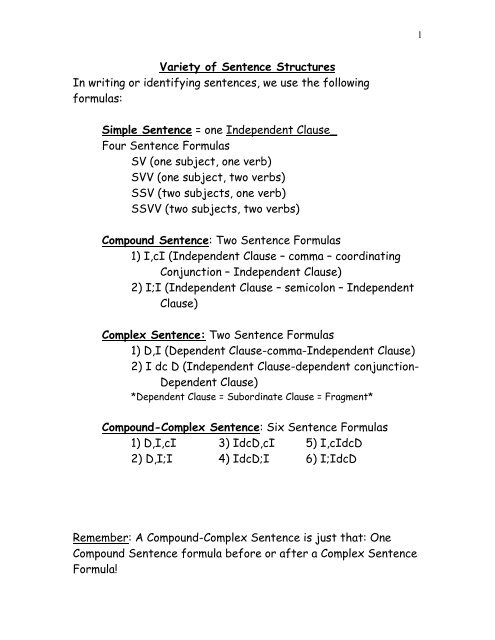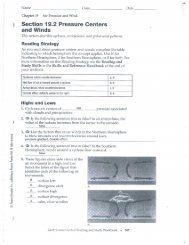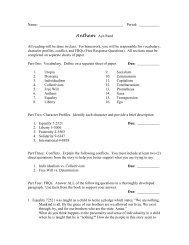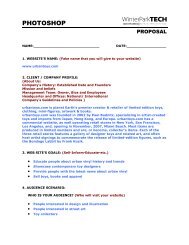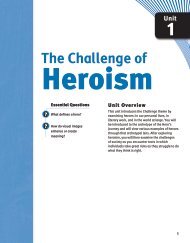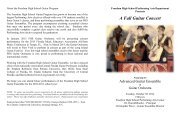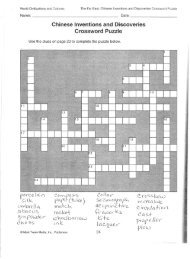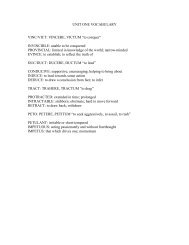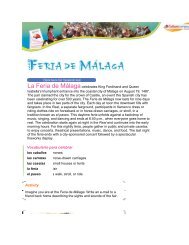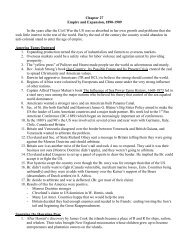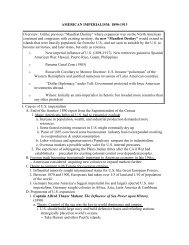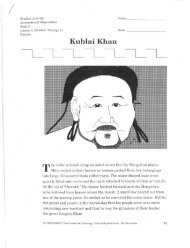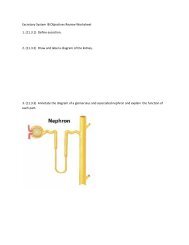Variety of Sentence Structures
Variety of Sentence Structures
Variety of Sentence Structures
Create successful ePaper yourself
Turn your PDF publications into a flip-book with our unique Google optimized e-Paper software.
<strong>Variety</strong> <strong>of</strong> <strong>Sentence</strong> <strong>Structures</strong><br />
In writing or identifying sentences, we use the following<br />
formulas:<br />
Simple <strong>Sentence</strong> = one Independent Clause_<br />
Four <strong>Sentence</strong> Formulas<br />
SV (one subject, one verb)<br />
SVV (one subject, two verbs)<br />
SSV (two subjects, one verb)<br />
SSVV (two subjects, two verbs)<br />
Compound <strong>Sentence</strong>: Two <strong>Sentence</strong> Formulas<br />
1) I,cI (Independent Clause – comma – coordinating<br />
Conjunction – Independent Clause)<br />
2) I;I (Independent Clause – semicolon – Independent<br />
Clause)<br />
Complex <strong>Sentence</strong>: Two <strong>Sentence</strong> Formulas<br />
1) D,I (Dependent Clause-comma-Independent Clause)<br />
2) I dc D (Independent Clause-dependent conjunction-<br />
Dependent Clause)<br />
*Dependent Clause = Subordinate Clause = Fragment*<br />
Compound-Complex <strong>Sentence</strong>: Six <strong>Sentence</strong> Formulas<br />
1) D,I,cI 3) IdcD,cI 5) I,cIdcD<br />
2) D,I;I 4) IdcD;I 6) I;IdcD<br />
Remember: A Compound-Complex <strong>Sentence</strong> is just that: One<br />
Compound <strong>Sentence</strong> formula before or after a Complex <strong>Sentence</strong><br />
Formula!<br />
1
A clause is a word group used as a complete sentence (Independent clause)<br />
or as an incomplete sentence/fragment = Subordinate clause - aka:<br />
Dependent clause.<br />
An independent clause is a group <strong>of</strong> words that contains at least one subject<br />
and one verb and can stand alone. (It makes a<br />
complete thought)<br />
Simple <strong>Sentence</strong>:<br />
A simple sentence is a group <strong>of</strong> words with one independent clause. A<br />
simple sentence may contain a single subject and a single verb, a compound<br />
subject and a single verb, a single subject and a compound verb, or a<br />
compound subject and a compound verb. The sentence must be complete (no<br />
words left out) in order to be scored as a simple sentence.<br />
****** Subjects are underlined with ONE line and verbs are underlined with TWO lines******<br />
Examples Explanation<br />
s v<br />
The boy ran to the store (SV) (Simple sentence with single<br />
subject and single verb)<br />
s s v<br />
The boy and girl ran in a relay race (SSV) (Simple sentence with<br />
compound subject, single verb)<br />
s v v<br />
Kevin went to the party and had a (Simple sentence with single<br />
wonderful time. (SVV) subject, compound verb)<br />
s s v v<br />
Sally and Susan are friends and play (Simple sentence with<br />
together <strong>of</strong>ten. (SSVV) compound subject , compound<br />
verb)<br />
2
Compound <strong>Sentence</strong><br />
A compound sentence consists <strong>of</strong> two or more independent clauses.<br />
In order to be scored as a compound sentence, two independent clauses must<br />
be joined either by a comma and coordinating conjunction or by a semicolon.<br />
(NO subordinating clauses – Dependent clauses in a compound sentence)<br />
A Coordinating Conjunction is always has a comma before it, and can be<br />
remembered as: “FAN BOYS”<br />
, for , and, ,nor ,but ,or , yet ,so<br />
Examples* Explanation*<br />
The boy ran to the store, and he (Compound sentence with a comma and<br />
bought some apples. (I,cI) a coordinating conjunction (,and)<br />
separating the two independent<br />
clauses.)<br />
Angles and devils came to the (Compound sentence with a semicolon<br />
costume party; they got along (;) followed by a pronoun,<br />
fine. (I;I) separating the independent clauses)<br />
*A Semicolon (;) in a Compound <strong>Sentence</strong> is always followed by the word<br />
“the”, a “noun”, or a “pronoun” which begins the second Independent Clause. *<br />
; the<br />
; noun (person, place, thing, quality or idea)<br />
; pronoun (it, she, he, them, us etc.)<br />
3
Complex <strong>Sentence</strong><br />
A Complex <strong>Sentence</strong> consists <strong>of</strong> one independent clause and one or<br />
more dependent clauses. Each clause must have a subject and a verb. A<br />
dependent clause must include a subordinating word (dependent conjunction),<br />
a subject and a verb.<br />
Subordinate / dependent clause = Fragment sentence. It cannot stand<br />
alone – It needs an independent clause either before it or after it.<br />
Two complex sentence formulas: D,I I dc D<br />
Common Subordinate (Dependent) Conjunction Words: (dc)<br />
after even if since<br />
although even though so that<br />
as if than<br />
as if in order that though<br />
as long as just as unless<br />
as soon as like until<br />
as though once when<br />
because provided whenever<br />
before rather than while<br />
** Dependent Conjunction words can be at the beginning <strong>of</strong> a complex sentence or in the middle**<br />
The dependent clause in a complex sentence may be an adverb clause, an adjective clause, or<br />
a noun clause.<br />
Complex <strong>Sentence</strong>s with adverb clauses- An adverb clause tells when, why, how, where,<br />
under what conditions, or with what result an action took place. The adverb clause my come<br />
before or after the independent clause.<br />
Examples* Explanation*<br />
Because baseball involves so much (Complex sentence with the<br />
strategy, it is my dad’s favorite dependent clause first and a<br />
sport. (D, I) comma separating the clauses.)<br />
Baseball is my dad’s favorite sport (Complex sentence with the<br />
because it involves so much strategy. Independent clause first. NO<br />
(I dc D) COMMA is required to separate<br />
the clauses) Used a Dep. Conj.<br />
4
Compound-Complex <strong>Sentence</strong><br />
A compound-complex sentence consists <strong>of</strong> two or more independent<br />
clauses and at least one dependent clause.<br />
*Remember*: A Compound-Complex <strong>Sentence</strong> is just that: One Compound<br />
<strong>Sentence</strong> formula before or after a Complex <strong>Sentence</strong> Formula.*<br />
Examples* Explanation*<br />
After the party was over, Jean had (A dependent clause (beginning<br />
a headache, so Paul cleaned up the mess. with a dc) followed by two<br />
(D,I,cI) independent clauses. -with<br />
comma and conjunction: ,so)<br />
Jean had a headache after the party (An independent clause followed<br />
was over, so Paul cleaned up the house. by a dependent clause (dc) and<br />
(I dc D, I) an independent clause. -with<br />
comma and conjunction: ,so)<br />
Jean had a headache, so Paul cleaned up (An independent clause-with<br />
the house after the party was over. comma and conjunction: ,so.<br />
(I,cI dc D) Followed by an independent<br />
clause and a dependent clause.)<br />
Although it was snowing, Floyd (An dependent clause followed<br />
planned to go to the game; Helen by two independent clauses.)<br />
wanted to stay home. (D,I;I)<br />
5


